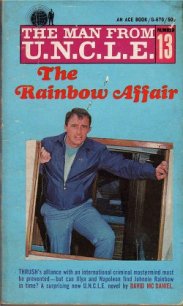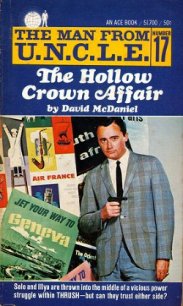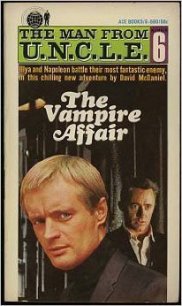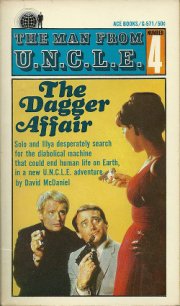The Utopia Affair - McDaniel David (электронные книги без регистрации TXT) 📗
Napoleon turned back to .his desk and cleared his throat. "Ah...you have misinterpreted the circumstances completely. Perhaps you would allow me to explain—over dinner some evening when you're free?"
Her face, reflected in the glass of a TV monitor he was watching, broke into a smile, quickly suppressed. She glanced at her watch, and said, "I'm sorry, Mr. Solo. Thank you for the invitation, but I'd prefer to wait and see how you work out."
And she was gone in a flicker as the priority communication signal chimed again and Napoleon reached to answer it.
At her desk, she touched a button and was answered. "Files."
"Marsha, time's up. Just about a minute ago—3:48."
"That was quick. Five and three-quarters... Miss Gruenwald had it."
"How much was in the pool?"
"Almost three dollars."
"Congratulate her for me. 'Bye."
Alexander Waverly had dozed on the plane during the endless day of his westward flight halfway around the world. At 11:00 A.M. he had taken off from a military airport near New York. Eighteen hours later it was sunset, and the coastline of New South Wales was a thin cloudbank on the ruddy horizon to starboard. Even though the sun had not set nor risen since he left New York Sunday morning, he knew it was now Monday evening. A pleasant hotel in Melbourne would be a stopping place for the night, and then the charter flight to Utopia tomorrow morning. His body, still on New York time, ached with the weariness of long confinement, but the fitful napping had left him tired enough to face the prospect of a normal night's sleep, after which he would awaken already half-adjusted to the change in circadian schedule.
His body would adjust to the new environment before his mind, he was sure. Only a small portion of his consciousness was wondering what lay ahead—most of his thoughts were still in New York, grappling automatically with the memories of problems which were supposed to lie behind him. Those submarine sightings off Clipperton Island—were they military maneuvers or not? And whose? The rash of illness that had gone through the European Continental HQ and had defied all efforts of Section Six to analyze it, let alone cure it. La Grippe was a convenient explanation, but scarcely adequate under the circumstances. He tried to remember if he had mentioned to Napoleon his suspicions in that matter.
He fumbled briefly in his coat pocket before remembering his communicator had been taken away from him at the airport. The doctor there to see him off had lifted it from its place, saying chidingly, "Now remember, you are officially on vacation."
Vacation! Waverly stared out his window at the deepening red of the sky as the coastline slipped beneath him. A murrain upon their vacations; he wasn't going to relax and enjoy it; his best medicine was his work. Besides, he still doubted the necessity for the outrageous expense Section Six was incurring in his name; two or three weeks in Vermont would have done quite as well. Upset and frustrated, he felt for his pipe, only to remember that it too had fallen to the probing fingers of his send-off delegation. He looked around the cabin for someone to complain to, saw no one, and gradually settled back. Thoroughly irritated, he stared out his little window into the purple stratosphere, where unfamiliar constellations stood with uncanny clarity, and drummed his fingers on the arm of his chair.
Utopia would take some getting used to. Waverly knew this as soon as he stepped from the little twin-jet shuttle plane that had brought him from Melbourne in a little over two hours. The last half hour had been over water as they passed well south of the vast, desolate Nullarbor Plain, and only gradually had they approached the coastline again.
Waverly had gotten a glimpse of his eventual destination as the plane was descending, but had retained only a confused impression of trees and open water—both alien to this part of the country—surrounded by steep and obviously artificial hills. The place was apparently square, he thought, but it must be at least fifteen miles on a side, the south edge opening to the sea. He lost sight of the mysterious interior as the jet slipped down into a long slot a quarter of a mile wide between the double wall of hills on the west side and touched down without a jar on a well-tended runway. By the time it finished taxiing, it was near a small hangar. A microbus was approaching.
As Waverly came out the door to the head of the exit ramp, he looked around. There were no structures but the aircraft hangar, and no marks of civilization but the narrow dirt road that wound off into the trees a short distance away. There was no sound except the mutter of the bus engine and the dying whine of the jet turbines. The air was warm and dry, and a light breeze stirred the leaves.
The driver came from the tail of the plane carrying Waverly's two suitcases. He lifted them into the bus, then stood to casual attention and opened the passenger door. Waverly settled his hat and climbed in.
A pane of glass separated the front and rear compartments, precluding conversation between driver and passenger. The ride was barely comfortable, and the road seemed designed to fit in with the genteelly primitive atmosphere. Waverly, studying the forest which was passing his window, was aware that it must not only have been transplanted, tree by tree, from somewhere far away, but would require a small lake of reasonably fresh water every week. That meant a large, probably concealed, desalinization plant. All things considered it would be atomic, and should supply all the water and power used by the resort, as well as profitable by products.
He nodded slightly. Perhaps he would be able to keep his mind occupied here after all. It would be interesting to see how much he could find out that Utopia might not want him to know.
He was pleased with his assigned bungalow, having half expected a log cabin. The driver doubled as bell man, carrying Waverly's suitcases inside, presenting him with the key and showing him around the comfortable four-room cottage. It boasted a small sitting room, a bedroom, workroom/office and kitchenette, with a bath and shower fitted into a corner. In the workroom were a telephone, a TV screen, and a few devices not instantly recognizable. One of them turned out to be the mouth of a small pneumatic tube which could deliver small articles. On the desk Waverly observed a humidor and lifted the lid out of curiosity. Then he looked up at the driver, who stood nearby.
"The staff is quite thorough," he said. "My own blend is difficult enough to obtain in New York; I would have thought it impossible here."
"Thank you," said the driver. "You will find the larder stocked to your taste, and the liquor cabinet as well."
"Hm. This must be costing someone a pretty penny."
"Value for value, sir. Now if you will allow me—" His guide touched a panel of buttons. "Your videoscreen serves many purposes. You may dial a two-way communication with any other guest, or any facility of the Park."
"How do I get an outside line?"
"You reserve one. You are allowed one hour a month; two minutes a day or fifteen minutes a week. We maintain only one link to the outside world. No radio communication can penetrate the jamming signal that covers the entire park. Most of our guests are here to get away from their work, and most of them would prefer to continue their usual load. There are five channels of music and three of entertainment available on your videoscreen; the music is accompanied by abstract color patterns. Dinner will be served in The Lodge at 7:00 P.M. You will find a guide to all our operations, schedules, and a map in the top drawer of your desk. The Lodge is half a mile away by the path that starts at your back door. You might want to get there early and look around. If there are any questions..."




